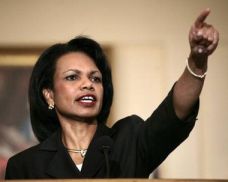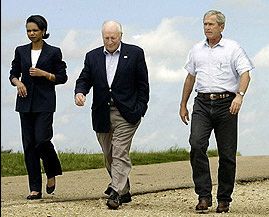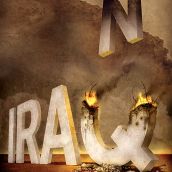|
Despite battle in the White House: war with Iran
By Daan de Wit
The Dutch in this article has been translated into English by Ben Kearney The answer to the question of why Iran has not yet been invaded by the United States can be found in the deteriorating situation in Iraq, which is providing Condoleezza Rice - in contradiction of Dick Cheney's vision - an opening to give negotiations a chance. Newsweek writes: 'One by one, the Cheneyites have been losing significant supporters in the top ranks of the administration--most recently White House deputy national-security adviser J. D. Crouch, a conservative former Pentagon official and academic who left last week. To thwart the hard-liners once and for all, though, Rice knows that she must start to deliver.' In addition to an increasingly restive population, Rice is getting backed up by criticism from within her own ranks, coming from such conservative heavyweights as Henry Kissinger, James Baker, Zbigniew Brzezinksi, Lawrence Wilkerson and high-ranking military officials that are speaking out - actually everybody except for the hardcore neoconservatives inside and outside the U.S. administration.  The question is, which of these two factions will end up getting the upper hand? Both factions have a chance, but the latter is the one with the finger on the button. They still have almost two years to bring about a glorious end to their reign and in so doing force a continuation of their policy, regardless of whether they are succeeded by a Democratic president or not. Meanwhile Rice is defending her position: '"The president of the United States has made it clear that we are on a course that is a diplomatic course," Ms. Rice said here. "That policy is supported by all of the members of the cabinet, and by the vice president of the United States."' The question is, which of these two factions will end up getting the upper hand? Both factions have a chance, but the latter is the one with the finger on the button. They still have almost two years to bring about a glorious end to their reign and in so doing force a continuation of their policy, regardless of whether they are succeeded by a Democratic president or not. Meanwhile Rice is defending her position: '"The president of the United States has made it clear that we are on a course that is a diplomatic course," Ms. Rice said here. "That policy is supported by all of the members of the cabinet, and by the vice president of the United States."'Military solution is goal of neoconservatives - outside the White House... The hardliners inside and outside the Bush Administration are continuing to pursue an open confrontation with Iran. Outside the administration, impatience is on the rise. This is the case with Bill Kristol for instance. No surprise there - back in 2003 this co-founder of the Project for the New American Century called for action in his magazine The Weekly Standard, and in November of last year he said that he anticipated that war was not far off. Neoconservative icon and member of the Council on Foreign Relations Norman Podhoretz agrees with him: '"I believe," Podhoretz told the Israel Broadcast Authority on May 24 (see video below), "contrary to what many people assume, that [Bush] will [attack Iran] before he leaves office, possibly shortly before he leaves office," thus leaving the political fallout to the incoming president, more than likely a Democrat. "[...] there is no alternative to military action."' To emphasize his view, Podhoretz compares Iranian President Ahmadinejad with Adolf Hitler, a not so subtle attempt to influence the debate, which both John Bolton, former U.S. ambassador to the U.N., and Israeli opposition leader Benjamin Nethanyahu, have ventured to do as well. ... and inside the White House  Within the Bush Administration, no one has embodied the most aggressive variant of the anti-Iranian mindset more than Vice President Dick Cheney: 'In the last few weeks, Cheney's staff have unexpectedly become more active participants in an interagency group that steers policy on Afghanistan, according to an official familiar with the internal deliberations. During weekly meetings of the committee, known as the Afghanistan Interagency Operating Group, Cheney staffers have been intensely interested in a single issue: recent intelligence reports alleging that Iran is supplying weapons to Afghanistan's resurgent Islamist militia, the Taliban, according to two administration officials who asked for anonymity when discussing internal meetings', writes Newsweek. The only problem with this is that Shiite Iran had earlier supported the U.S. in its fight against the Sunni Taliban, and that the link that Cheney is looking for doesn't exist, even though weapons have been found. Within the Bush Administration, no one has embodied the most aggressive variant of the anti-Iranian mindset more than Vice President Dick Cheney: 'In the last few weeks, Cheney's staff have unexpectedly become more active participants in an interagency group that steers policy on Afghanistan, according to an official familiar with the internal deliberations. During weekly meetings of the committee, known as the Afghanistan Interagency Operating Group, Cheney staffers have been intensely interested in a single issue: recent intelligence reports alleging that Iran is supplying weapons to Afghanistan's resurgent Islamist militia, the Taliban, according to two administration officials who asked for anonymity when discussing internal meetings', writes Newsweek. The only problem with this is that Shiite Iran had earlier supported the U.S. in its fight against the Sunni Taliban, and that the link that Cheney is looking for doesn't exist, even though weapons have been found.Media in maelstrom over first part of the war: the war over the voice of the public at large Newsweek writes about the weapons that Cheney is looking for: 'British officials who asked for anonymity because of the nature of their work emphasize that they lack hard evidence linking the shipments to the Revolutionary Guards, and that the weapons could just as easily have been bought on the black market in Iran'. This brings up questions about the backgrounds of the anonymous 'officials' that form the source of an article last Sunday in the Washington Post with the headline Iranian Flow Of Weapons Increasing, Officials Say. These kinds of articles hearken back to the period during the build-up to the war in Iraq, which is so clear to see in the documentary Buying the War - How did the mainstream press get it so wrong? Compared to the Washington Post, Reuters is a bit more objective in a story on Secretary of Defense Robert Gates when it notes above the article: U.S. says can't link Tehran to Afghan arms flow. Professor Juan Cole is unhappy with the suggestive coverage in the press over the alleged Iranian arms shipments: 'The message of administration and military spokesmen is that Iran is deliberately killing US troops and is a major source of insurgency in Iraq. No convincing evidence has ever been presented for either allegation [...] Yet the New York Times and even the Guardian put this b.s. on the front page, and of course it is all over CNN, Fox Cable News, MSNBC, etc. Are US journalists trapped in the the dictates of the military-industrial complex by virtue of working for these mega corporations?' Interesting question. Aside from this case, it won't be the first time that Iran is blamed for violence that ultimately appeared to have a western background: 'Terror devices used by the IRA in a vicious murder campaign in Ulster blew up British servicemen [in Iraq] as the world blamed Iran', reads the headline in The Independent, which goes on to write: 'This contradicts the British government's claims that Iran's Revolutionary Guard is helping Shia insurgents to make the devices.' Provocations and/or false flag operation to precede conflict In mid-February Miles O'Brien of CNN asked Hillary Mann, former National Security Council director for Iran and the Persian Gulf, whether or not the U.S. was  getting ready for a war against Iran. As the text underneath the picture crawls by reading: 'Bush administration: Picking a Fight?' Mann answers (videoclip-transcript): '[...] they're trying to push a provocative accidental conflict. They're pushing a series of increasing provocations against the Iranians in, I think, anticipation that Iran will eventually retaliate, and that will give the United States the ability to launch limited strikes against Iran, to take out targets in Iran that we consider to be important.' Zbigniew Brzezinski, former National Security Advisor to President Carter, would happen to agree with her. He goes even further and in front of a Senate commission warns of the possibility of a false flag operation: 'A plausible scenario for a military collision with Iran involves [...] some provocation in Iraq or a terrorist act in the U.S. blamed on Iran; culminating in a "defensive" U.S. military action against Iran that plunges a lonely America into a spreading and deepening quagmire eventually ranging across Iraq, Iran, Afghanistan, and Pakistan.' History abounds with examples of American tactics such as those that Mann and Brzezinski are describing, and though they are unknown by the public at large, the statements of both of these insiders succeed in putting them into an understandable context. getting ready for a war against Iran. As the text underneath the picture crawls by reading: 'Bush administration: Picking a Fight?' Mann answers (videoclip-transcript): '[...] they're trying to push a provocative accidental conflict. They're pushing a series of increasing provocations against the Iranians in, I think, anticipation that Iran will eventually retaliate, and that will give the United States the ability to launch limited strikes against Iran, to take out targets in Iran that we consider to be important.' Zbigniew Brzezinski, former National Security Advisor to President Carter, would happen to agree with her. He goes even further and in front of a Senate commission warns of the possibility of a false flag operation: 'A plausible scenario for a military collision with Iran involves [...] some provocation in Iraq or a terrorist act in the U.S. blamed on Iran; culminating in a "defensive" U.S. military action against Iran that plunges a lonely America into a spreading and deepening quagmire eventually ranging across Iraq, Iran, Afghanistan, and Pakistan.' History abounds with examples of American tactics such as those that Mann and Brzezinski are describing, and though they are unknown by the public at large, the statements of both of these insiders succeed in putting them into an understandable context.Research shows: military solution disastrous The hopes and expectations of those calling for an attack on Iran directly contradict the findings of an investigation [PDF] carried out by the Oxford Research Group: 'In the report's introduction, Hans Blix, the former chief of the nuclear watchdog International Atomic Energy Agency (IAEA), wrote that "armed attacks on Iran would very likely lead to the result they were meant to avoid - the building of nuclear weapons within a few years."' Just like a number of high-ranking American military officials, the group pleads in another report [PDF] for negotiations. Dr. Ian Davis, the director of BASIC, writes: "[...] an actual working Iranian nuclear weapon remains at least five years down the line. There is time for constructive dialogue. This wave of unsubstantiated media allegations undermines the potential for a diplomatic breakthrough. We hope that this report will put Iran's role in Iraq in context."' Not everyone is being so subtle about it; the BBC writes: 'Dr Mohamed ElBaradei, head of the International Atomic Energy Agency, described those wanting to bomb Iranian nuclear facilities as "new crazies".' 'Crazies' is a term that, according to ex-CIA officer Ray McGovern, was originally used during the 1980's to describe members of the Reagan and Bush administrations. Cheney determined to see confrontation with Iran In the United States the power of the president is greater than is often understood to be by Europe. The above-mentioned Wilkerson calls Bush 'the bigger guy' relative to Cheney, and Rice underscores this in a statement she made in an interview with Newsweek: 'There's only one expression that matters, and that's the president of the United States.' It's well-known that President  Bush is not the strategic and intellectual heavyweight that is called for by the office that he holds. This means that figuring out whose opinions are ultimately going to prevail is not so simple. Condoleezza Rice is close to the president and represents a broad coalition. Opposite that is the influence of Dick Cheney. Cheney is politically superior to Bush, and uses the power delegated to him by Bush to fulfill his own policy objectives. For instance, it's for this reason that Bush is directly responsible in name only for the aftermath of the attack on Iraq and the flouting of the Geneva accords by the U.S., according to Lawrence Wilkerson, the former chief of staff for Colin Powell, as expressed in an interview with PBS. In addition to Cheney's political influence there is his brute force, which appeals to the fundamental modus operandi of George W. Bush, the man who is the figurehead of his administration and who undoubtedly wants to polish his reputation for the history books before the end of his term. Considering the deplorable situation in which the Bush Administration finds itself due to the situation in Iraq and the near infinite list of scandals, the alternative - the possible result of the negotiations advocated by Rice - is coming up short: "we're laying the foundations for someone else to succeed in the future, and I think that's fine."' It's nice to place your hopes in the good deeds of a future president, but in its weakness it is unacceptable for the forceful Cheney. Bush is not the strategic and intellectual heavyweight that is called for by the office that he holds. This means that figuring out whose opinions are ultimately going to prevail is not so simple. Condoleezza Rice is close to the president and represents a broad coalition. Opposite that is the influence of Dick Cheney. Cheney is politically superior to Bush, and uses the power delegated to him by Bush to fulfill his own policy objectives. For instance, it's for this reason that Bush is directly responsible in name only for the aftermath of the attack on Iraq and the flouting of the Geneva accords by the U.S., according to Lawrence Wilkerson, the former chief of staff for Colin Powell, as expressed in an interview with PBS. In addition to Cheney's political influence there is his brute force, which appeals to the fundamental modus operandi of George W. Bush, the man who is the figurehead of his administration and who undoubtedly wants to polish his reputation for the history books before the end of his term. Considering the deplorable situation in which the Bush Administration finds itself due to the situation in Iraq and the near infinite list of scandals, the alternative - the possible result of the negotiations advocated by Rice - is coming up short: "we're laying the foundations for someone else to succeed in the future, and I think that's fine."' It's nice to place your hopes in the good deeds of a future president, but in its weakness it is unacceptable for the forceful Cheney.Cheney sending Israel and Bush in the direction of war Bush is also playing his part in the musical composition arranged by Cheney by ordering so-called black operations in an effort to effect a regime change in Iran: 'Mr Bush has signed an official document endorsing CIA plans for a propaganda and disinformation campaign intended to destabilise, and eventually topple, the theocratic rule of the mullahs', writes The Telegraph. One component of the plan: 'Teheran has been sold defective parts on the black market in a bid to delay and disrupt its uranium enrichment programme, the precursor to building a nuclear weapon.' The Iranians already know about the followup: how to manufacture an atomic bomb. This thanks to the blueprint of the said weapon of mass destruction that was handed over to the Iranians by the U.S. A mistake was assimilated into the blueprint, albeit one that was immediately identifiable. For more details on this suspicious Operation Merlin see part eight of the DeepJournal series on the coming war with Iran. There has been some discussion as to the question of whether ABC's scoop on Bush's black operations (above and beyond the operations that have already been detailed in this DeepJournal series and above and beyond the support given to pro-Sunni groups opposed to Hezbollah) was a conscious attempt to undermine Bush and Cheney's aggressive policy.
DeepJournal
Sign up for the free mailing list. |
|
9 September 2013
Why is Syria under attack? - Part 4
‘Syria’ is about power, money, influence and energy
8 September 2013
Why is Syria under attack? - 3
Syria and Iran are like pieces on a geopolitical chessboard
7 September 2013
Why is Syria under attack? - Part 2
On the interests of the parties involved in the Syrian conflict and the role of the media
6 September 2013
Why is Syria under attack? - Part 1
Who is behind the chemical weapons attack in Syria?
1 April 2013
Albert Spits: Creëer je eigen financiële veiligheid
Beluister het interview
|




 Cheney is saying that Bush is making a mistake and thus needs to have the choices before him narrowed. [...] Multiple sources have reported that a
Cheney is saying that Bush is making a mistake and thus needs to have the choices before him narrowed. [...] Multiple sources have reported that a